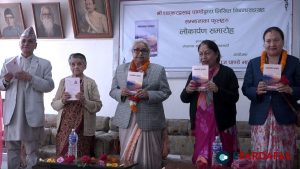
Creepy Vibes: How Nepali TikTokers Are Responding to the Ban

Nepal’s recent decision to ban TikTok has ignited a wave of discontent among TikTokers, with some resorting to creepy and cringe-worthy statements to express their displeasure. The ban, announced during a Council of Ministers’ meeting, was justified by Prime Minister Dahal as a measure to control social chaos and maintain harmony.
Criticism of the ban has arisen from various TikTok personalities, each making statements that range from immature to downright absurd.
In a television interview, Tiktoker Eva Giri made an unusual plea for employment alternatives, revealing a lack of understanding about professional responsibility and the broader economic landscape. Her statement suggested that the ban could jeopardize the income of TikTok influencers, leading to economic challenges in the country.
Miss Pabi, another TikTok celebrity, made a cringe-worthy remark about playing music videos, a sentiment that does little to address the government’s concerns about social harmony.
Actor Jay Kishan Basnet added to the immature narrative by questioning the leaders’ decision without providing any substantive argument against the ban.
Actor, model, and TikToker Istu Karki took an arguably cringe-worthy stance during a recent interview, suggesting that TikTok played a crucial role in helping Nepal gain recognition globally. She claimed that Nepal was not famous before TikTok and TikTokers existed.
Famous TikToker Anshu Burma, while attempting to present a positive image, resorted to an immature justification by stating, “Since joining TikTok, I have helped the poor, helpless, destitute, and those who are suffering from natural calamities with more than 50 million.” Such a statement fails to acknowledge the broader issues at hand and reduces the impact of charitable actions to a mere number.
In contrast, TikToker Mahesh Jaishi exhibited a rare moment of maturity by admitting that the app was being misused for spreading social disharmony and personal hatred. This acknowledgment stands out amidst the sea of immature reactions from other influencers.
The ban has led to a migration of TikTok users to alternative platforms, raising concerns about the legality and security of such applications. Reports of bank accounts being hacked while using TikTok through unofficial apps add a layer of seriousness to the debate, emphasizing the need for responsible social media usage.
The decision to ban TikTok follows extensive discussions among political parties, both ruling and opposition, reflecting a consensus to curb the perceived negative impact of the platform on society. The government cited concerns about the alleged disruption of social harmony by TikTok, echoing practices adopted by other democratic nations.
- Minister Gurung Hails Ghalegaun’s Role in Promoting Homestay Tourism Across Nepal
- India Accelerates Arms Procurement Amid Push for Military Modernization
- Development Spending Reaches Just 29% in Third Quarter of FY 2024/25
- Former King Gyanendra Extends New Year Wishes, Expresses Concern Over Recent Violence












Comments